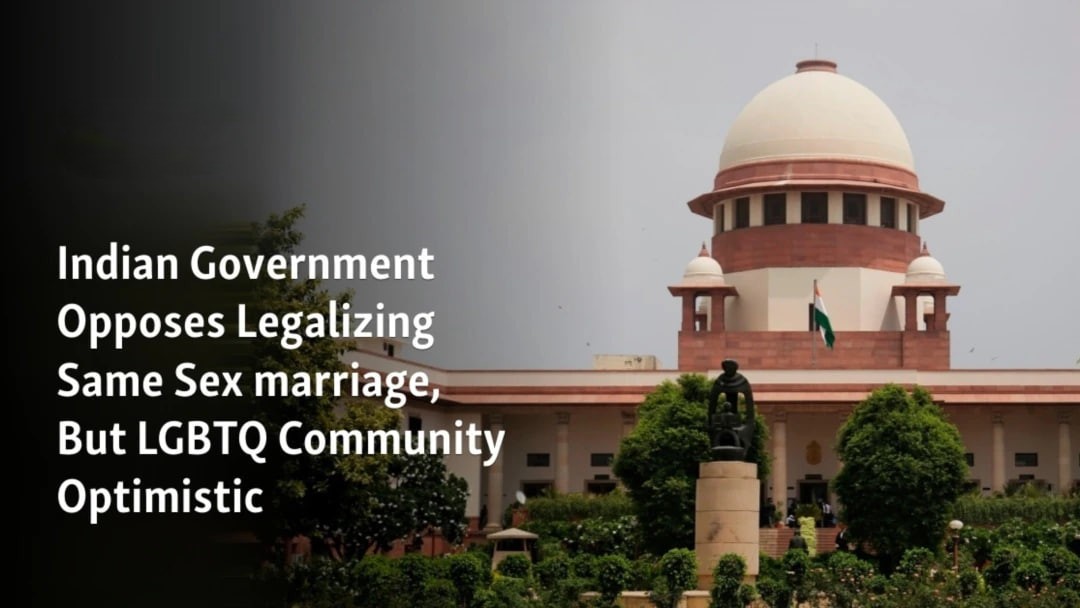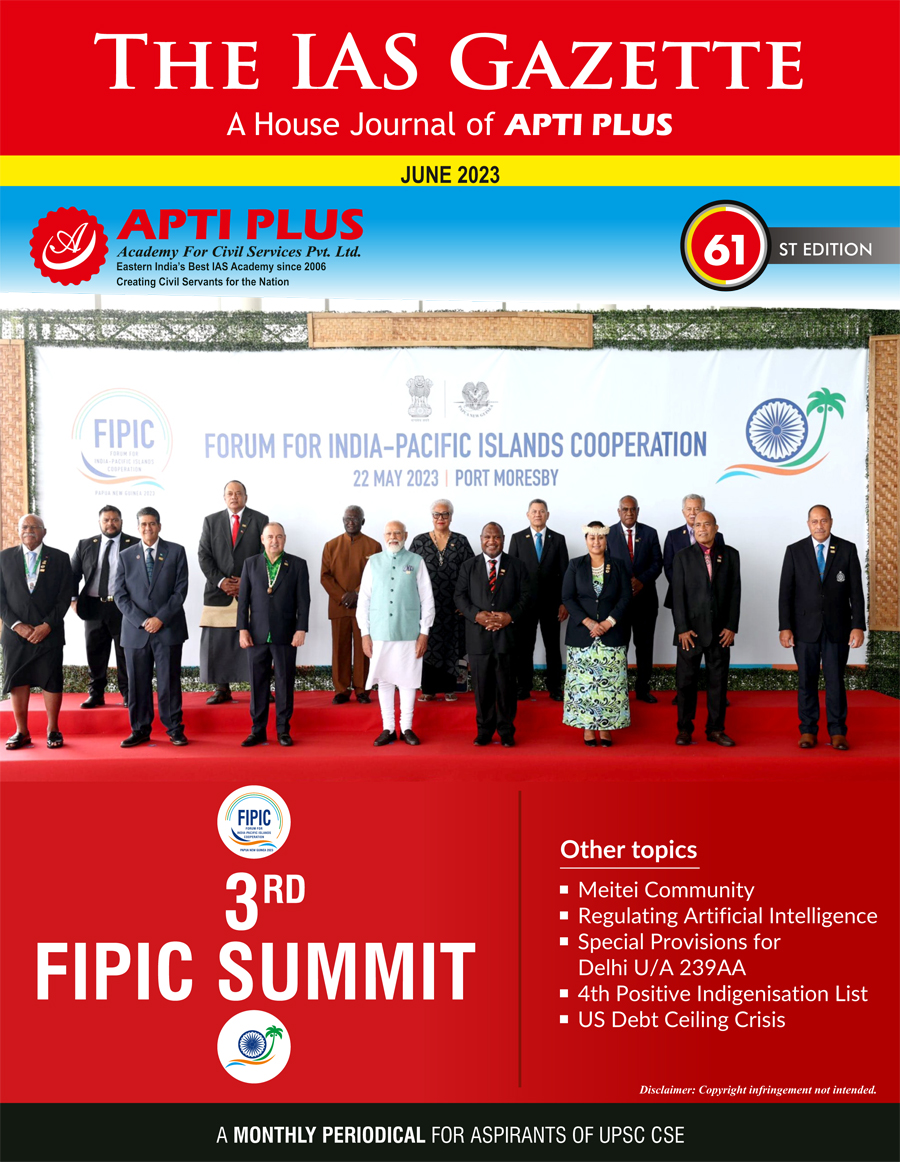
Copyright infringement not intended
Context: The Supreme Court heard the government's arguments in the case seeking legal recognition of same-sex marriage.
Details
- The Indian government has been facing a legal challenge from several same-sex couples who are seeking recognition of their marriages under the law.
- The Supreme Court has been hearing arguments from both sides on whether the existing legal framework can accommodate such unions or whether new legislation is required.
Government's arguments against same-sex marriage
- The Union Government has opposed recognising same-sex marriages and has urged the court to leave the matter to Parliament.
Religious definitions of marriage
- Various religions have always recognised marriage only between a man and a woman, and that if a new idea of marriage has to be imagined, then it must be Parliament and not the court which can create it.
- The Special Marriage Act 1954, which is a secular law for inter-faith marriages, originates in personal law and cannot be reinterpreted to include same-sex couples.
The legitimate interest of the State
- The state has a legitimate interest in regulating marriage, and the right to marry is not absolute and is always subject to the statutory regime provided by the competent legislature.
- The Centre has cited several aspects of marriage which the state has regulated, such as the age of consent, prohibition of bigamy, prohibited degrees of marriage, judicial separation, and divorce.
Constitutional morality v/s Public morality
- Constitutional morality cannot override public morality, and the court cannot impose its views on society.
- Public morality is based on social values and customs, and that same-sex marriage is not accepted by a large section of society.
-min.jpg)
International Law and comparative jurisprudence
- International law and comparative jurisprudence do not support same-sex marriage, and India cannot blindly follow the decisions of other countries.
- Only 29 out of 193 countries have legalised same-sex marriage, and many countries have constitutional or statutory bans on it.
Impact on Family Structure and Social Fabric
- Same-sex marriage will have an adverse impact on the family structure and the social fabric of India.
- Marriage is not only a union of two individuals but also a foundation of society and a source of social stability.
- Concerns about the rights of children born out of such unions.
No violation of fundamental rights
- Denying same-sex marriage does not violate any fundamental rights of LGBT couples.
- The right to marry is not absolute and is subject to the statutory regime provided by the competent legislature.
- The state has a legitimate interest in regulating marriage and its various aspects, such as the age of consent, prohibition of bigamy, divorce, etc.
No Provision under the Special Marriage Act
- It is a secular law for inter-faith and inter-caste marriages and does not apply to same-sex couples.
- The Act was enacted to overcome some limitations of religious personal laws, not to create a new social legal institution.
Earlier Supreme Court Judgement
- The Supreme Court's judgment in Navtej Singh Johar v/s Union of India (2018), which decriminalised consensual homosexual acts under Section 377 of the Indian Penal Code, did not confer any positive rights on same-sex couples.
- The judgment only recognised their right to privacy and dignity, not their right to marry.
Not against Same-Sex Couple
- The government is not opposed to same-sex couples cohabiting or celebrating their unions, but it does not mean that they are entitled to legal recognition of marriage.
- The government has urged the court to leave the issue of same-sex marriage to the wisdom of Parliament, which can enact suitable legislation after considering all aspects of the matter.

Petitioners' arguments for same-sex marriage
- The petitioners have challenged the constitutional validity of Section 5 of the Special Marriage Act 1954, which defines marriage as a union between a male and a female.
- The petitioners have also invoked Articles 14, 15, 19 and 21 of the Constitution to claim their right to marry their partners of the same sex.
Recognition of dignity and autonomy
- Same-sex marriage is a matter of dignity and autonomy for LGBT couples, who have been historically discriminated against and stigmatised by society.
- The petitioners have relied on the landmark judgment of Navtej Singh Johar v/s Union of India (2018), which decriminalised homosexuality under Section 377 of the Indian Penal Code, and recognised the right to sexual orientation as a part of the right to privacy under Article 21.
Protection from violence and harassment
- Same-sex marriage will protect from violence and harassment for LGBT couples, who often face threats, abuse and extortion from their families, police and society.
- Same-sex couples have been forced to separate, undergo conversion therapy or commit suicide due to social pressure.
Access to benefits and entitlements
- Same-sex marriage will enable access to benefits and entitlements for LGBT couples, such as joint property rights, inheritance rights, adoption rights, insurance benefits, pension benefits, tax benefits, medical benefits etc.
Conclusion
- The Supreme Court is expected to deliver its verdict on this matter soon. The outcome of this case will have far-reaching implications for the rights and status of same-sex couples in India. It will also test the limits of judicial activism and legislative supremacy in a democracy.
Must Read Articles:
Same-Sex Marriage in India: https://www.iasgyan.in/blogs/same-sex-marriage-in-india
Same-Sex Marriage Law: https://www.iasgyan.in/daily-current-affairs/same-sex-marriage-law
|
PRACTICE QUESTION
Q. How can India balance its constitutional commitment to equality and non-discrimination with its cultural and religious diversity while considering the legalisation of same-sex marriage?
|


https://indianexpress.com/article/explained/explained-law/state-on-same-sex-marriage-8580058/




